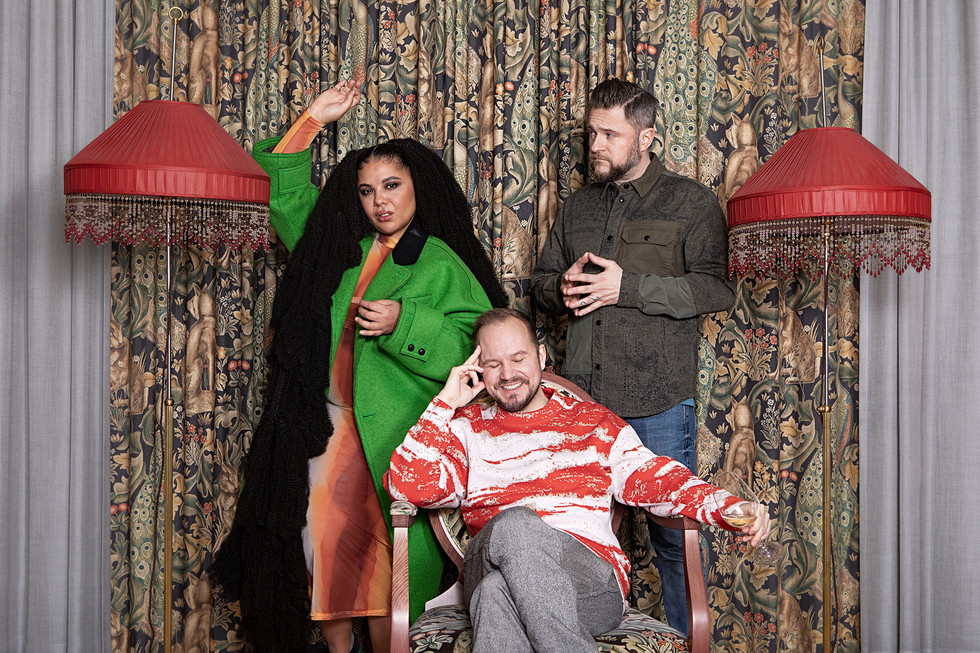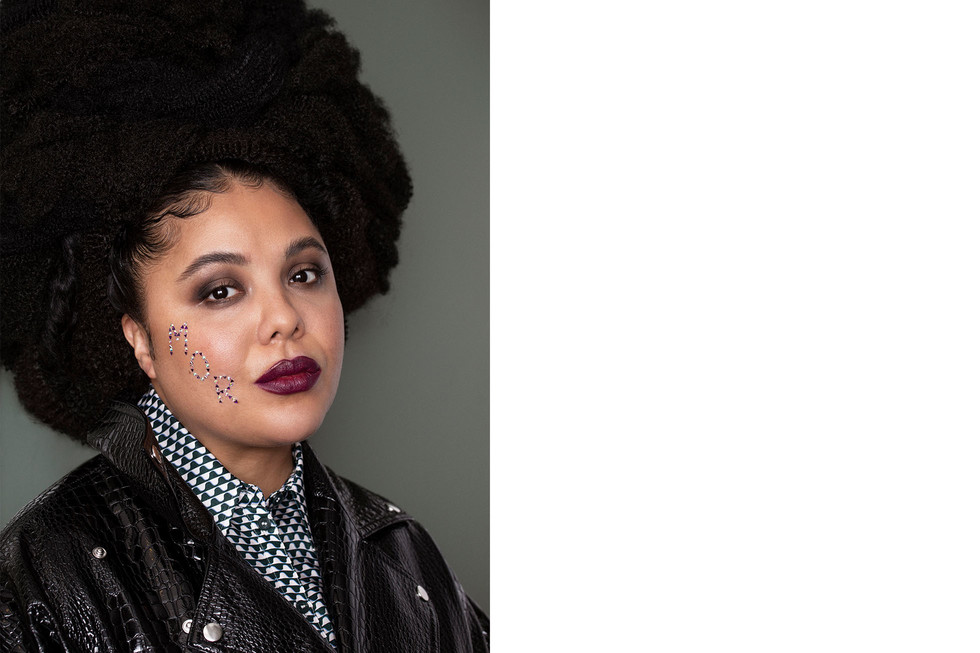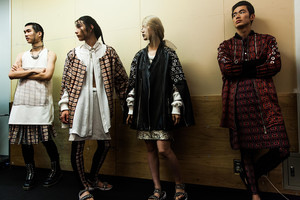In Remarkable Feel-Good Symbiosis, an Interview With Mor
Written by Decirée Josefsson by Sandra MyhrbergThe year is 2020, there's ongoing isolation and thirst for something uplifting.
Jacqueline Mapei Cummings is currently back from Thailand, planning to meet up with producers Thomas Rusiak and Fredrik Okazaki to make a new album. Three music legends, Mapei, Okazaki, and Rusiak not knowing that first session was about to be the skeleton of something much bigger than a band, a brilliant artcraft. MOR is not only a force of wisdom and hope, defined by more than the incentive to attract money. They are also a leading light of gratitude and a statement that if you genuinely love what you do and create from a space of joyfulness, external elements won't make your creativity limited. It’s soulful, abstract, and free of interpretation. A humble movement where art means conversation.
I met the three of the members for beers one afternoon at a local bar near their studio, asked them about the background, story, and experiences being a member of MOR:
When you first got together did you know right away that this was something special?
F: My theory is that everything goes down to the deep understanding of one and other feelings. There is no pride. On the contrary, there’s an environment built on the fundamentals that we like to hang out and make music that we genuinely love. That in combination with respect towards each other created a space where creativity has been flowing with tremendous ease. After the first session, we decided to change the primary thought of making an album for Jackie. Instead we created a band that today stands for a family.
T: We have been approaching music with similarities, however there have been directions one might think is straggly and incoherent. Jackie is multifaceted and has been able to manage every part of those spiky out-of-the-box ideas. Together we have been able to control and produce pure greatness. I get chills talking about what we have created, it’s been everywhere and nowhere and suddenly we’re almost done with two albums and every song has its unique touch, still the very same movement.
J: I’ve been very inspired by the thoughts and feelings from us as individuals when it comes to lyrics and melodies. We talk a lot about day-to-day romanticism while hanging out. These reflections, feelings, and thoughts are something that I like to bring with me into the studio. That is what creates a story and context. Everything feels natural and safe. It's a soothing feeling for the demons to be able to express freely based on your emotions.
The first material consists of 17 songs. This was the outcome of a handful of spontaneous sessions together. The first thought was to release everything all at once, suicide for the carrier one would say. It ended up in two upcoming albums. The first single, Spitfire was released earlier in October this year. Jacqueline Mapei Cummings said while describing the song “You will never experience love if you don’t welcome it” which is based on how individuals sometimes won’t let themselves be proved to love. Spitfire is one of 13 songs from their first album, set to release at the end of February.
F: When we meet up we usually chit-chat for hours, making music for fifteen minutes. It has never been a must, which makes all of us very open-minded about the outcome. Focusing on the attitude and energy between us instead of forcing the outcome of the song.
J: A shallow room without touchable feelings isn't a sustainable way to create. Every conversation and word between gets manifested into songs. That is genuinely what creates our content. The real world.
T: Everything has been about now and then, with heart and ears towards finding that raw and genuine feeling of sound.
J: We are like three different bottles of wine on the same shelf. Storing and aging individually but properly match each other mentally. Even if we have lived separate lives our knowledge obtained, gathered the same mental wisdom.
What is your relationship with the music industry, in many ways controlled and designed to fit into frames?
J: As a mutual force those frames felt good to not care about one's for all. We’re throwing us off the edge a little bit. Not caring so much if something doesn't fit into the box of a specific genre.
F: There’s been a mutual sprinkle of fatigue towards the attitude in the industry. There’s no bad music. It’s the lack of friendliness.
J: The side you get tired of is more or less the shift of focus from the pure love and art in making music. It’s even worse today with social media and everything being so approachable.
T: I haven’t been working in the music industry for quite some time, and starting to notice people's behavior and reactions has been easier coming back. “Swedish jealousy”is a term. Includes backstabbing and competitiveness. There’s however almost only love and positive feedback towards the material and us as a unit. I’ve been receiving commendations from people I haven’t talked with for years.
J: It’s important not to exclude positivity. The ones that are with us on this journey have been showing love and appreciation.
T: I guess we’re quite bulletproof. There’s nothing to hate about this music. You don’t necessarily have to like or appreciate it. Everyone can hear the joyfulness and euphoria that the three of us have experienced while producing this music. That simplicity makes people more frustrated because there's nothing to touch.
J: Some can give us the evil eye, then jealousy and skepticism can shine through. Even if there’s a very small percentage expressing this it feels great not to be lonely in that swarm.
T: Maybe the situation would have been different if we were alone. Now we’re a united force.
Would you consider there’s a message that has to be said with your music?
J: If something needs to be said, the story we have created is like the journey of melancholic depression. There's grief and hope.
F: It’s also worth noting the simplicity of gratefulness towards your friends, to connect and be appreciative of your relationships.
J: Leave the rooms you’re not comfortable in. As the creator of your life, decisions should be based upon that.
F: It’s not always easy to find your place in the entertainment industry. It’s been important to maintain the rustic environment while working with this project and to create a rather safe space for the music to be able to develop freely. Going to the studio for a session is all about the feeling. We have placed candles, flowers, and paintings in the room. Preserving the intimate and natural feeling.
J: In many of the studios I've visited, I have felt homeless. It’s really big to have a standing point like these two guys have, with such welcoming, kindness, and professionality without any underlying intention.
How come this is so important for you, the minimalism and familiarity?
F: The American entertainment culture is based on the purpose of pleasantness. There's a strong similarity to entertain, no matter how commercial, indie, or whatever genre it might be. Not saying that there is something wrong with it. It simply means that every step you take doesn't need to define your inner child. At some point as an individual, the inner child of ours wants to define itself, sometimes all it wants is to create based on feeling.
J: It goes back to the realness of doing what you love. Tired of constantly touching the surface, when it’s easy to be real.
T: Not saying that this constellation is the best or the most unique. However, this colorful collaboration has been a fun new artistic way of approaching musical writing and producing.
Max Jenny said in an interview with Odalisque “Life is like a theater but instead of people playing a part, they’re really just being themselves. So, I don’t need a lot of fuel, life is inspiring as it is.” The three old friends have gathered unique experiences, wisdom creating a story that has become a movement in remarkable feel-good symbiosis. That group is called MOR.
















